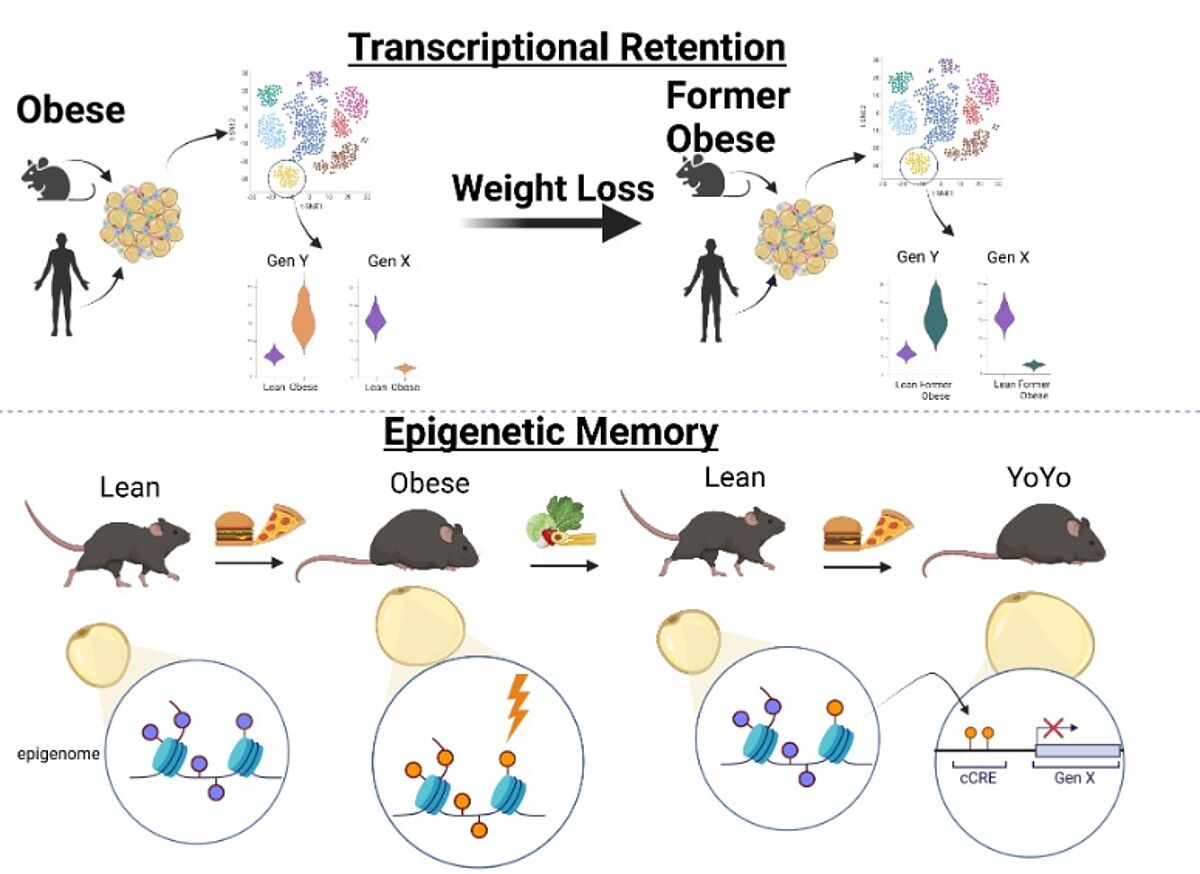Adipose tissue retains an epigenetic memory of obesity after weight loss
The fight against obesity often focuses on reducing body weight to improve metabolic health and prevent related comorbidities. However, one of the biggest challenges is maintaining weight loss over the long term. Research has increasingly pointed to the concept of an "obesogenic memory"—a biological phenomenon where the body retains a predisposition to regain weight, even after significant weight loss.
A recent study by researchers from ETH Zurich published in Nature (1) sheds light on this process, using advanced methods like single-nucleus RNA sequencing to explore the molecular mechanisms of obesogenic memory. The research reveals that both human and mouse adipose tissues retain transcriptional and epigenetic changes induced by obesity, even after substantial weight loss.
Figure 1 | Epigenetic memory of obesity (2)
Key findings
- Persistent cellular changes:
- Adipocytes in both humans and mice exhibit obesity-induced alterations that remain even after significant weight reduction. These changes impact the cells' functionality and their response to metabolic stimuli.
- Epigenetic modifications:
- In mouse models, the researchers observed stable epigenetic changes. These changes "prime" adipocytes for pathological responses in obesogenic environments, making it easier for the body to regain lost weight.
- Accelerated weight rebound:
- Mice with this obesogenic memory showed rapid weight regain when exposed to a high-fat diet after weight loss. The study links this rebound effect to persistent deregulation in genes associated with metabolism, inflammation, and adipocyte function.
- Human relevance:
- Although the human data were derived from bariatric surgery patients, the findings suggest that similar epigenetic mechanisms could contribute to the "yo-yo" dieting effect, where individuals regain weight following non-surgical weight loss interventions.
Conclusion
These findings provide valuable insight into the biological mechanisms that make long-term weight maintenance challenging. This study is one of the first to demonstrate that specific cell types, such as adipocytes, can retain an epigenetic memory of a prior metabolic state. This discovery has significant implications for our understanding of obesity, weight loss, and weight maintenance, highlighting the role of persistent cellular changes in weight regain. On a societal level, this research may offer solace to individuals struggling with obesity by suggesting that the difficulty in maintaining weight loss is not solely a matter of willpower or motivation but is also influenced by deeper biological mechanisms. By identifying these factors, the study paves the way for future interventions aimed at targeting these epigenetic changes to support more effective and sustainable weight management strategies.
Curious? Read the full article here.
Featured products
| Cat-No. | Item | Size | Price (CHF) |
|---|---|---|---|
| D4003-1-25 | DNA Binding Buffer | 25 ml | 31.00 |
| R1016 | RNA RNA Clean & Concentrator-5 w/ Zymo-Spin IC Columns (Capped) | 200 preparations | 698.00 |
| D4004 | DNA Clean & Concentrator-5 w/ Zymo-Spin I Columns (Uncapped) | 200 preparations | 423.00 |
Featured supplier

Zymo Research
Zymo Research is a leader in molecular biology, offering a comprehensive range of products for DNA, RNA, and epigenetics research. Established in California in 1994, the company is renowned for its high-quality nucleic acid purification technologies, including kits and reagents for DNA and RNA clean-up, isolation, and sequencing. Zymo is also a pioneer in epigenetics, with products for DNA methylation analysis, chromatin analysis, and NGS library preparation. Each product is designed to be simple to use, reliable, and available at competitive prices, making them ideal for both academic and biopharmaceutical research.
References
- Hinte, L.C., Castellano-Castillo, D., Ghosh, A. et al. Adipose tissue retains an epigenetic memory of obesity after weight loss. Nature (2024). https://doi.org/10.1038/s41586-024-08165-7
- ETH Zurich, Laboratory of Nutrition and Metabolic Epigenetics website: https://epigenetics.ethz.ch/news/nme-news/2024/11/our-newest-paper-is-out-adipose-tissue-retains-an-epigenetic-memory-of-obesity-after-weight-loss.html

